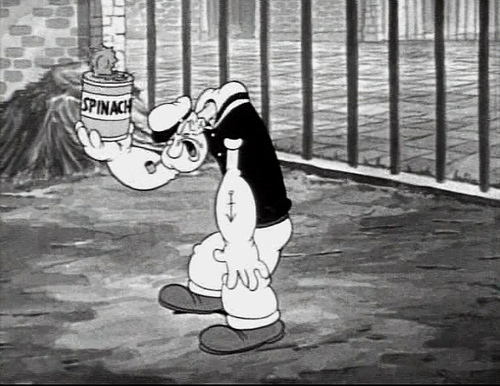
During the Depression, spinach farmers in Crystal City, Texas, erected a statue of Popeye — the cartoon character almost singlehandedly saved the spinach industry.

During the Depression, spinach farmers in Crystal City, Texas, erected a statue of Popeye — the cartoon character almost singlehandedly saved the spinach industry.
Christopher Lee has 211 screen credits, more than any other living actor. He’s performed in English, French, Canadian, German, Russian, Norwegian, Swedish, Italian, Pakistani, Spanish, Japanese, American, Australian and New Zealand productions.
If that’s not impressive enough, he’s also 6 foot 5 and a direct descendent of Charlemagne.
Addresses of fictional characters:
Dr. John Dolittle
Oxenthorpe Road
Puddleby-on-the-Marsh
Slopshire, England
Clark Kent
344 Clinton Street
Apt. 3B
Metropolis, USA
Leopold Bloom
7 Eccles Street
Dublin, Ireland
Miss Marple
Danemead
High Street
St. Mary Mead
Hercule Poirot
Apt. 56B
Whitehaven Mansions
Sandhurst Square
London W1, U.K.
Lucy Ricardo
Apartment 4A
623 East 68th Street
New York, New York
The Simpsons
742 Evergreen Terrace
Springfield, USA

In 1908, Jim Garside, the landlord of Leeds’ Adelphi Inn, was called before the local magistrate. In places where alcohol is consumed, English law permits betting only on games of skill. Garside had been permitting bets on darts. Wasn’t that a game of chance?
Garside summoned a dartboard and local champion William “Bigfoot” Anakin, who proceeded to hit every number the court named.
Garside was discharged.
Baseball is a game of statistics, but numbers can be deceiving. It’s possible for one batter to outperform another in both halves of the season and still receive a lower batting average:
| First Half | Second Half | Total Season | |
| Player A | 4/10 (.400) | 25/100 (.250) | 29/110 (.264) |
| Player B | 35/100 (.350) | 2/10 (.200) | 37/110 (.336) |
This is an example of Simpson’s paradox, a mathematical quirk that arises occasionally in social science and medical statistics.
“SENDING VESSELS OVER NIAGARA FALLS. — There have been three such instances. The first was in 1827. Some men got an old ship — the Michigan — which had been used on Lake Erie, and had been pronounced unseaworthy. For mere wantonness they put aboard a bear, a fox, a buffalo, a dog and some geese and sent it over the cataract. The bear jumped from the vessel before it reached the rapids, swam toward the shore, and was rescued by some humane persons. The geese went over the falls, and came to the shore below alive, and, therefore, became objects of great interest, and were sold at high prices to visitors at the Falls. The dog, fox, and buffalo were not heard of or seen again.
“Another condemned vessel, the Detroit, that had belonged to Commodore Perry’s victorious fleet, was started over the cataract in the winter of 1841, but grounded about midway in the rapids, and lay there till knocked to pieces by the ice.
“A somewhat more picturesque instance was the sending over the Canada side of a ship on fire. This occurred in 1837. The vessel was the Caroline, which had been run in the interest of the insurgents in the Canadian rebellion. It was captured by Colonel McNabb, an officer of the Canada militia, and by his orders it was set on fire then cut loose from its moorings. All in flames, it went glaring and hissing down the rapids and over the precipice, and smothered its ruddy blaze in the boiling chasm below. This was witnessed by large crowds on both sides of the falls, and was described as a most magnificent sight. Of course there was no one on board the vessel.”
— From Barkham Burroughs’ Encyclopaedia of Astounding Facts and Useful Information, 1889
Elton John’s middle name is Hercules.
“Somebody said to me, ‘But the Beatles were anti-materialistic.’ That’s a huge myth. John and I literally used to sit down and say, ‘Now, let’s write a swimming pool.'” — Paul McCartney
Donald Duck’s middle name is Fauntleroy.
From Bespin to Yavin, the “Star Wars Hit Probability Equation” predicts the outcome of any battle:

n is the number of “bad guys,” x is the number of “good guys,” and J is the number of Jedi present (if any).
The equation reads, “The probability of a bad guy hitting his target is equal to the inverse of all bad guys present plus the cube of the number of good guys present (plus one) plus the number of Jedi present (plus one) to the 10th power.”
So the presence of a good guy reduces the bad guys’ accuracy, and having even one Jedi present is bad news for the Empire.